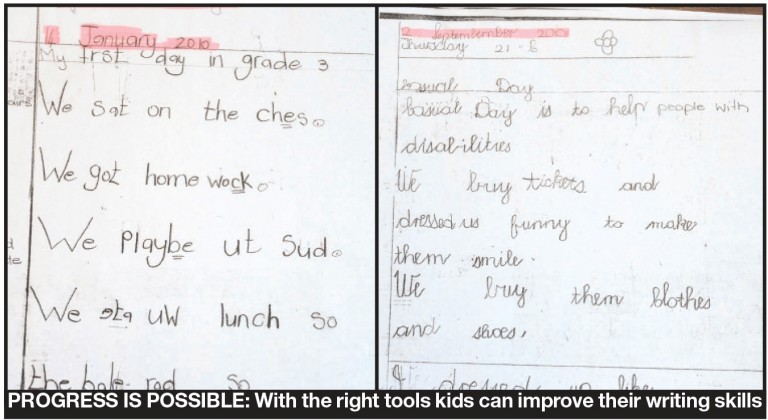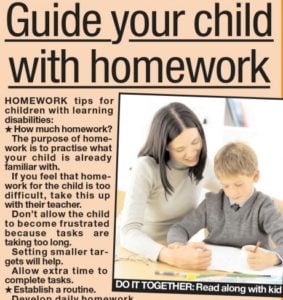 This article appeared in the Daily Voice on October 29, 2013:
This article appeared in the Daily Voice on October 29, 2013:
IMAGINE going through school unable to read, spell or write properly.
You know you are not “stupid” but you just can’t seem to get the work into your head.
You could be one of thousands of people who struggle with a learning disability in South Africa.
Children with learning disabilities aren’t lazy or dumb. They simply process information differently, or lack the skills to do so in the same way as others.
To rectify this, their brain has to be retrained, says Zainu Allie of Edublox, a company assisting children with learning disabilities.
“We brain train – we work on the children’s foundational learning skills. It’s not the school work that is the problem, it is how the child is processing and interpreting the information they see and hear in class,” Zainu explains.
Learning difficulties is a general term for different conditions. Some are well-known, such as dyslexia and attention deficit hyperactivity disorder (ADHD), while others are less so, such as dyspraxia and Asperger’s syndrome.
Researchers believe a common factor in learning disabilities is a faulty cerebellum, which links to nearly all the major brain centres.
The cerebellum is key to the learning process – by making skills become automatic through practice.
Understand
But if it’s not working efficiently, it affects functions such as reading, writing, concentration, co-ordination and social skills.
Zainu says with the correct methods, the cerebellum can be trained to work properly.
“We do exercises to improve skills like memory,” she says.
“Once the memory improves, concentration will start improving, the child’s ability to process information will improve. Once the brain functions properly, everything else starts falling into place.
“We don’t teach subjects, we work with the skills that are needed to read, spell and write – that is to listen properly, to ‘see’ what is being taught and process that information, and understand instructions.”
Making use of programmes like Edublox is highly effective – in one case a seven-year-old girl was taught how to read in just 10 days.
Dyslexia is a learning disability that often goes unnoticed, and it’s the most common in the country.
Zainu says in most cases, teachers pick up a learning disability when children under-perform in class.
“But this can be difficult because public school classes are big. A lot of children fall by the wayside because teachers are overworked.”
One dyslexic child who did fall through the cracks is Jamie Wyngaard, 22. But unlike so many others, this brilliant young man is not letting his disability hold him back.
Even though his condition was picked up in high school, it was only at university that the young entrepreneur was diagnosed with dyslexia.
“I thought maybe I just had a hard time focusing and spelling,” Jamie says.
Struggling to read and write encouraged Jamie to study even harder, and he was able to matriculate. But when his condition started interfering with his biotechnology studies, he sought help.
Despite his dyslexia, this young mogul in the making started his own business when he was just a teenager.
Today, he is the owner of The Agency SA, which specialises in logos, events and company branding. He also owns a theatre production company, and is launching a rooftop cocktail lounge called Sky Fall.
He also helped develop a game called Play Trade, which won Best Game Concept of the Year 2012.
“I won’t be able to do what I do if it wasn’t for spell-check, I just have to deal with it,” he jokes.
Jamie has learnt new methods and skills to help him manage his disability, and he prefers to do it on his own steam.
“I refuse to take my medicine because I feel it will change my thinking. The way my brain works is a gift and not a medical condition. Just because you’re different from the rest of the world doesn’t mean you can’t be successful,” he says.

Know the symptoms
The following symptoms could indicate that a person has a learning disability. Please consult a medical expert if you suspect someone suffers from a learning disability.
- Struggling to read, spell and write;
- Poor results at school, failing despite their best efforts;
- Writing in “reverse” ― confusing the letters b and d, writing words like rat for tar;
- Omitting letters or syllables, for example, they read or write cat instead of cart;
- Trying to sound out words and still getting it wrong;
- Reading and writing letters in the wrong order, for example dear instead of read;
- Spelling words like they sound;
- Reading without understanding and also remembering little of what they read;
- Children might become stressed, depressed and dislike attending school;
- Low self-esteem, feeling they are “stupid”.
.
 Guide your child with homework
Guide your child with homework
Homework tips for children with learning disabilities:
How much homework?
The purpose of homework is to practise what your child is already familiar with.
If you feel that homework for the child is too difficult, take this up with their teacher. Don’t allow the child to become frustrated because tasks are taking too long.
Setting smaller targets will help. Allow extra time to complete tasks.
Establish a routine
Develop daily homework routines for the child. Set up a written or visual plan, which should include a particular place set aside for homework as well as extra-mural activities.
Create a suitable homework environment
The homework space should be as quiet as possible, which will help with better concentration. The work space should also be clean and have the necessary items required, like pens, pencils and other stationery.
Find the best time
Keep in mind that your child has had a long day at school as they had to work 10 times harder than their peers, so a break is beneficial before starting with homework.
Daily reading is essential
Practice is required to develop dyslexic children’s reading skills. So reading on a daily basis would be beneficial.
To prevent your child from getting frustrated while reading, read aloud with them as it helps them to understand and enjoy what’s being read. Reading along with books and CDs can be very helpful.
Organisation
Get a comprehensive homework plan in order. Include revision of subjects. Have set homework plans. Have time checks for homework and results.
Keep in contact with teachers to check if homework and tasks are being completed correctly.
.
